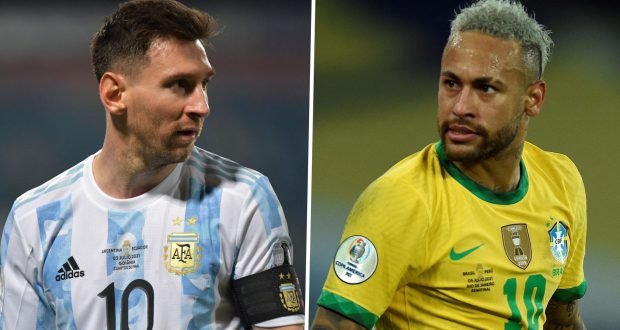Their destinies intertwined, through Barcelona & PSG, the two stalwarts carry the burden of two football-obsessed cultures.
Like two giant trees inhabiting a rarefied footballing estate, the shadows of Lionel Messi and Neymar merge into each other, no matter how hard they try to keep them unto themselves. When Neymar united with Messi in Barcelona, all nerves and doubts, the Argentine put him at ease, and together with Luis Suarez, formed one of the deadliest tridents this century.
When the shadow that Messi cast became too long, or when Neymar presumed so, he moved to PSG so that he could flourish and branch out alone. But four years later, they reunited at the Paris club, this time Neymar playing the role of the gracious host. “We are just meant to be. I haven’t spent as much time with my family, as I have with Leo,” the Brazilian had said then.
Perhaps, they are just meant to be. Messi is five years older than Neymar. He was already a great leaping to the pedestal of an all-time great when Neymar burst forth. The Brazilian was never a competitor, but the inheritor. It was how Barcelona wanted their destinies to unfold. Messi would leave in autumn for the spring of Neymar. But like fate and destiny, human ambition and quest for centre-stage, it did not pan out to Barcelona’s best-written script. However, their fates intertwined again in Paris, long shadows again cast over each other, and again struck an irresistible chemistry.
The pair now have tagged together in 200 matches, clocked 15,865 minutes and combined to produce 67 goals, besides countless hours training and travelling together. Both call each other brother, their families spend vacations together. It’s a tale of bromance, but also one of competitiveness and futility to drift away from each other. Theirs is a parallel but interwoven storyline that keeps overlapping, branches of one tree crawling into the other.
Their shadows and destiny converge together again on Friday, 20 kilometres and an hour apart, as they lead their respective teams into the quarterfinals, Brazil taking on Croatia and Argentina encountering the Netherlands, and if both advance, Neymar and Messi would be literally pursuing each other’s shadows next week in the semifinals in what would be the most irresistible of showdowns, a fixture that squeezes in geographical, political and linguistic tensions, apart from their ravenous quest for footballing one-upmanship.
Both are united in the crushing burden two football-obsessed cultures have thrust on their shoulders. Messi has been carrying the burden longer than Neymar has. He has endured the heartbreak of a final, agony of two quarterfinal exits and the backlash of a round-of-16 departure. The Copa title was a redemption, and since then, the thread of destiny dragging Messi to the elusive World Cup in Doha has gathered bass and volume.
At peace with himself
Evident is a sense that Messi is at his calmest, yet feistiest, at a World Cup. As if he had transcended the rock of burden, as if he is no longer hyper-fixated with the World Cup or matching Maradona’s stature back home. He is unworried about perceptions and legacies, about failures and failings. As if all he wants to do is enjoy what could be his last World Cup. He smiles more often, chides more frequently, picks fights with defenders, expresses both anger and joy more expressively. As if he has descended from his inscrutable celestial bubble to middle earth. And though Argentina have not been spectacular, they have produced moments; Messi has conjured moments. What once seemed a burden looks like the fuel propelling Messi towards fulfilling his last wish on a football field. The flicker that renders his halo a perfect circle.
But the fortunes of Argentina are thrust on his feet and shoulders. It’s just that he is not feeling the weight. The fate of Brazil, though, does not depend on Neymar, or on Neymar alone. The hype-machine did not maniacally whirr, he almost flew under the radar but for life-size illuminated silhouettes flickering on the facade of Doha towers. A nation did not mourn his ankle injury. Brazil won a match without him. It is no longer about Neymar alone; it is no longer about Neymar-dependencia. It has been about Richarlison and Vinicius Junior too; about Thiago Silva and Casemiro too. As it rarely unfolds, it was about the collective dazzle and not individual sizzle of the Brazilian team, about dance and dribbles, bicycle kicks and pile-drivers, about romance and flair.
The obsessive attention away from him, from media, spectators and even defenders, has liberated Neymar. Quietly, he enjoyed one of his finest World Cup games against South Korea, when he weaved and spun, pirouetted and danced between defenders and defence-lines. It was not often like that in the past. So heavily fouled he was at the last World Cup that he became over-conscious of getting fouled. Neymar lost a bit of Neymar-ness about him, becoming ever more petulant a figure. He would dribble and twinkle past a bevy of defenders before suddenly braking, presuming the defender making a mistake himself, a hasty tackle or a hideous shove. He, thus, was playing reactionary football, self-destroying his own game and that of his team. The start-stop routines were so frequent that it confused his fellow front-men, who were often caught out of position. Brazil, thus, lost their coherence.
 Times Of Pedia Times of Pedia TOP News | Breaking news | Hot News | | Latest News | Current Affairs
Times Of Pedia Times of Pedia TOP News | Breaking news | Hot News | | Latest News | Current Affairs





